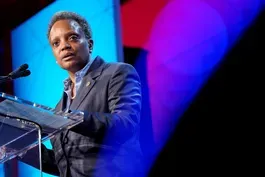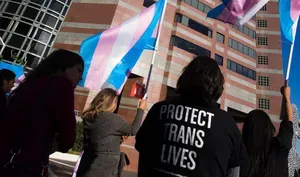
Pharmaceutical giant slashes insulin prices after pressure
Clip: 3/1/2023 | 5m 12sVideo has Closed Captions
Pharmaceutical giant slashes insulin prices after pressure from government and consumers
More than seven million Americans rely on insulin and prices for the life-saving drug have sky-rocketed. With pressure mounting on pharmaceutical companies to address the cost of diabetes care, Eli Lilly announced it’s cutting prices for its most popular insulin products by 70% and capping out-of-pocket costs at $35 a month. Bram Sable-Smith of Kaiser Health News joined Geoff Bennett to discuss.
Problems with Closed Captions? Closed Captioning Feedback
Problems with Closed Captions? Closed Captioning Feedback
Major corporate funding for the PBS News Hour is provided by BDO, BNSF, Consumer Cellular, American Cruise Lines, and Raymond James. Funding for the PBS NewsHour Weekend is provided by...

Pharmaceutical giant slashes insulin prices after pressure
Clip: 3/1/2023 | 5m 12sVideo has Closed Captions
More than seven million Americans rely on insulin and prices for the life-saving drug have sky-rocketed. With pressure mounting on pharmaceutical companies to address the cost of diabetes care, Eli Lilly announced it’s cutting prices for its most popular insulin products by 70% and capping out-of-pocket costs at $35 a month. Bram Sable-Smith of Kaiser Health News joined Geoff Bennett to discuss.
Problems with Closed Captions? Closed Captioning Feedback
How to Watch PBS News Hour
PBS News Hour is available to stream on pbs.org and the free PBS App, available on iPhone, Apple TV, Android TV, Android smartphones, Amazon Fire TV, Amazon Fire Tablet, Roku, Samsung Smart TV, and Vizio.
Providing Support for PBS.org
Learn Moreabout PBS online sponsorshipGEOFF BENNETT: More than seven million Americans rely on insulin, and over the last two decades, prices for the lifesaving drug have skyrocketed.
With pressure mounting on pharmaceutical companies to address the high cost of diabetes care, drugmaker Eli Lilly announced today it's cutting the prices for its most popular insulin products by 70 percent and capping out-of-pocket costs at $35 a month.
We're joined now by Bram Sable-Smith.
He's a reporter with Kaiser Health News It's good to have you here.
And, Bram, how significant of an announcement is this?
I mean, given the way that drug pricing works in this country, a company's list price doesn't necessarily reflect how much insurers will cover and how much folks end up paying out of pocket.
BRAM SABLE-SMITH, Kaiser Health News: That's true.
And that's been the criticism of a lot of the approaches to addressing the high cost of insulin in the past.
So, you will remember, in the Inflation Reduction Act last year, Congress passed a $35 cap for some Medicare patients for insulin.
There was talk, there were proposals to pass a similar cap for all insured patients.
The criticisms with that -- those kinds of caps is that it doesn't address the list price.
So if you're uninsured or you're underinsured, you would still be exposed to the high list price of these products.
So, by reducing the list price of insulin, it's a really significant step.
And it gets at some of the criticisms that people have had in the past for addressing this issue.
GEOFF BENNETT: Will this announcement by Eli Lilly push other insulin makers to follow suit?
BRAM SABLE-SMITH: It's certainly possible.
I mean, you saw President Biden applauded the announcement.
Bernie Sanders has written letters to the CEOs of Sanofi and Novo Nordisk.
Those two companies, together with Eli Lilly, account for something like 90 percent of insulin that's used in the United States of America.
So, Bernie Sanders has written letters to their CEOs asking them to follow suit.
So there's certainly pressure.
GEOFF BENNETT: As you mentioned, this announcement by Eli Lilly puts the company in line with the provisions in the Inflation Reduction Act capping out-of-pocket costs for seniors who rely on insulin.
But let's talk about how we got here, because, in 1999, one vial of Humalog, which is a diabetes drug, cost $21 a vial.
In 2019, that cost was $332.
That's a 1000 percent increase.
How did that happen?
BRAM SABLE-SMITH: You know, one of the ways to think about it, I kind of describe it as a "Game of Thrones" that pharmaceutical companies are playing with insurers and these middlemen called pharmacy benefit managers.
And the gist of it is that you will have an insurance company that has millions of patients that they provide insurance for, and through these middlemen, they will go to the pharmaceutical company, and they will say, hey, we want to make your insulin the preferred insulin on our list, but, in return, we want a good deal on it.
So the manufacturers will provide these things called rebates to the middlemen, who will then pass some or all of it on to the insurer.
And it creates these incentives for high prices, so that everybody will get their cut along the way.
But what that doesn't take into account is the uninsured and underinsured patients.
So when you don't have insurance, or you have a high-deductible plan, something like that, you could be exposed to these high list prices, that really were never meant for patients.
GEOFF BENNETT: How big of a financial burden has this been for folks up until now?
I mean, there are millions of Americans who have been rationing their insulin.
BRAM SABLE-SMITH: Yes, that's right.
And a study came out last year that something like 17 percent of Americans who use insulin had rationed it.
A lot of that is because of financial constraints.
And there are plenty of stories.
I mean, I have written some.
There have been plenty other stories have been written by other reporters, other journalists, about people who've actually died from rationing their insulin because they didn't feel they were able to afford the insulin they needed to survive.
So, I mean, it's been a really big issue.
GEOFF BENNETT: So, what will you be watching for in the weeks and months to come?
BRAM SABLE-SMITH: Mm-hmm.
Well, I'm certainly interested to see if the other insulin manufacturers will also reduce the list prices of their insulin.
I'm interested to see if Congress will continue to take action itself.
President Biden, in the State of the Union this year, called for a more universal co-pay cap.
I'd be interested to see if Congress will do something along those lines.
There's also initiatives in states around the country that are worth keeping an eye on.
So, California, for example, has an initiative that they're going to manufacture their own insulin to bring it in at a lower price.
And continuing on that path could provide even more market pressure for other companies to reduce the list price of the insulin products.
GEOFF BENNETT: Bram Sable-Smith is a reporter with Kaiser Health News.
Thanks so much for your time and for your insights.
BRAM SABLE-SMITH: Thanks for having me.
Arizona Republican turns to art after political career ends
Video has Closed Captions
Clip: 3/1/2023 | 3m 28s | Republican who opposed 2020 election lies finds time for art after political career ends (3m 28s)
Climate change and the risk of spreading diseases
Video has Closed Captions
Clip: 3/1/2023 | 7m 37s | Is climate change accelerating the risk of disease spreading from animals to humans? (7m 37s)
News Wrap: Chicago voters oust mayor with crime a top issue
Video has Closed Captions
Clip: 3/1/2023 | 5m 55s | News Wrap: Chicago voters oust mayor in election where crime was a top issue (5m 55s)
Parents concerned as new laws target transgender children
Video has Closed Captions
Clip: 3/1/2023 | 11m 3s | Parents concerned as new state laws restrict rights of transgender children (11m 3s)
Ruling party candidate wins Nigeria's presidency
Video has Closed Captions
Clip: 3/1/2023 | 5m 23s | Ruling party candidate wins Nigeria's presidency after disputed vote (5m 23s)
'Very unlikely' adversary caused Havana Syndrome, U.S. says
Video has Closed Captions
Clip: 3/1/2023 | 6m 20s | 'Very unlikely' foreign adversary caused Havana Syndrome, U.S. intelligence says (6m 20s)
Providing Support for PBS.org
Learn Moreabout PBS online sponsorshipSupport for PBS provided by:
Major corporate funding for the PBS News Hour is provided by BDO, BNSF, Consumer Cellular, American Cruise Lines, and Raymond James. Funding for the PBS NewsHour Weekend is provided by...
















